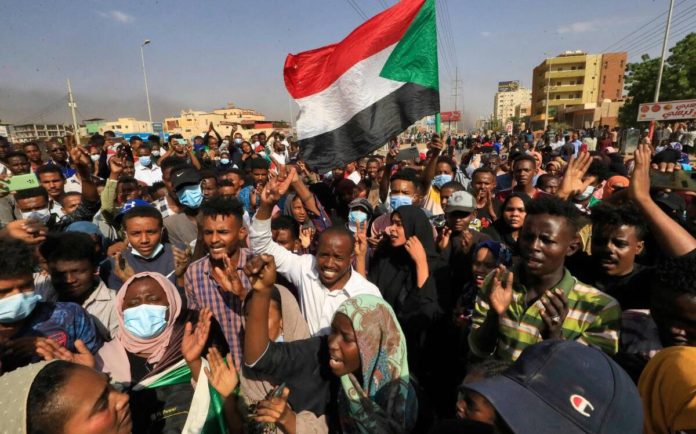A coup is under way in Sudan, where the military has dissolved civilian rule, arrested political leaders and declared a state of emergency.
The coup leader Gen Abdel Fattah Burhan has blamed political infighting.
Protests against the coup have spread to several cities including Khartoum. Three people are said to have died after being shot by the armed forces.
Military and civilian leaders have been at odds since long-time ruler Omar al-Bashir was overthrown two years ago.
BBC Arabic’s Mohamed Osman, in Khartoum, says large numbers of protestors are on the streets of the capital demanding the return of civilian rule.
More protestors are expected to join the crowds after calls for action by political parties and professional unions, our correspondent said. He added that doctors have refused to work at hospitals and institutions under military rule, except in emergencies.
“We are ready to give our lives for the democratic transition in Sudan,” another protester, Haitham Mohamed said.
Army and paramilitary troops have been deployed across Khartoum, the city’s airport is closed, and international flights are suspended. The internet is also down.
At least three people have been killed and 80 have been injured, the Sudan Central Doctor’s Committee wrote on its Facebook page. It said those who died had been shot by soldiers.
Video footage from Khartoum on Monday showed large groups in the streets, including many women. Barricades of burning tyres can be seen in the streets, with plumes of black smoke rising in various parts of the city.
“There is tension and also violence because people tried to go to the army headquarters… they were met with gunshots”, human rights defender Duaa Tariq told the BBC. She added there was fear and confusion in the streets, but also solidarity between the protesters.
Civilian leaders arrested
Prime Minister Abdallah Hamdok and his wife are among those reported to have been detained and put under house arrest, along with members of his cabinet and other civilian leaders. Their whereabouts are unknown.
They are part of a transitional government designed to steer Sudan towards democracy after the rule of former president, Omar al-Bashir.
It also said Mr Hamdok was being pressed to support a coup but was refusing to do so, and instead he urged people to continue with peaceful protests to “defend the revolution”.
Gen Burhan had been leading the power-sharing arrangement between military and civilian leaders, known as the Sovereign Council.
In a televised address, he said infighting between politicians, ambition and incitement to violence had forced him to act to protect the safety of the nation and to “rectify the revolution’s course”.
He said Sudan was still committed to “international accords” and the transition to civilian rule, with elections planned for July 2023.

But a senior official from the prime minister’s office, Adam Elhiraika, told the BBC that the coup could lead Sudan back into a civil war, adding “the risk is very high – extremely high”.
Although Sudan remains in a deep economic crisis, it had been receiving more international support. A military takeover will put that at risk.
International condemnation
World leaders have reacted with alarm to the military’s move.
The UK’s special envoy for Sudan and South Sudan, Robert Fairweather, tweeted that military arrests of civilian leaders was “a betrayal of the revolution, the transition and the Sudanese people”.
The African Union, of which Sudan is a member, said it had learned with “deep dismay” of the situation, and called for the “strict respect of human rights”.
The US, EU, UN and Arab League have also expressed deep concern.
The military and civilian transitional authorities have ruled together since 2019, when President Bashir was toppled after months of street protests.
The power-sharing deal between the military and a loose coalition of groups – the Forces for Freedom and Change (FFC) – saw the launch of the Sovereign Council.
It was scheduled to rule the country for another year – with the aim of holding elections and transitioning to civilian rule.
But the deal was always fractious, with a large number of rival political groups – and divisions within the military too.
Tensions grew further after a coup attempt attributed to followers of Mr Bashir was foiled in September.
Sudan has been unable to find a workable political system since independence in 1956 and has seen numerous coups and coup attempts.























Comments are closed.